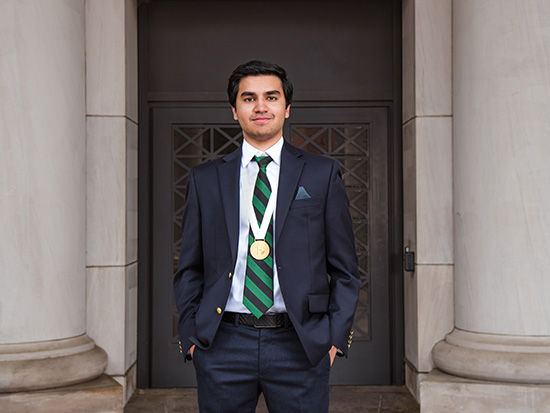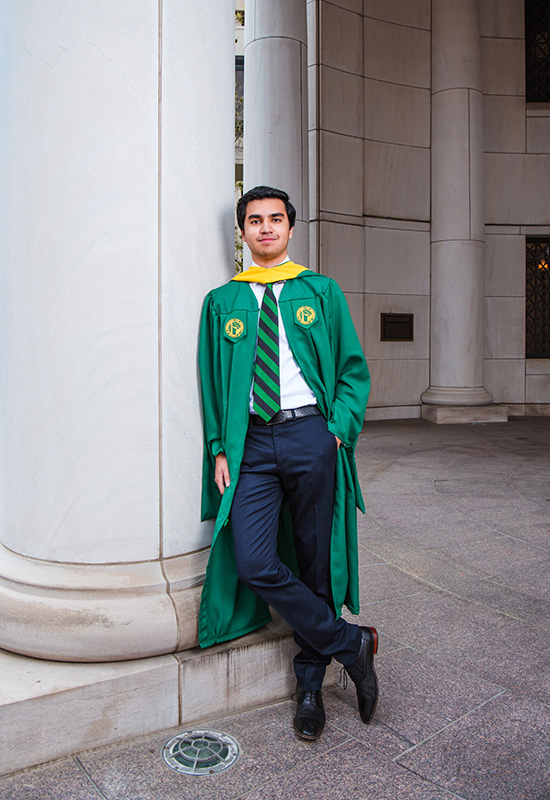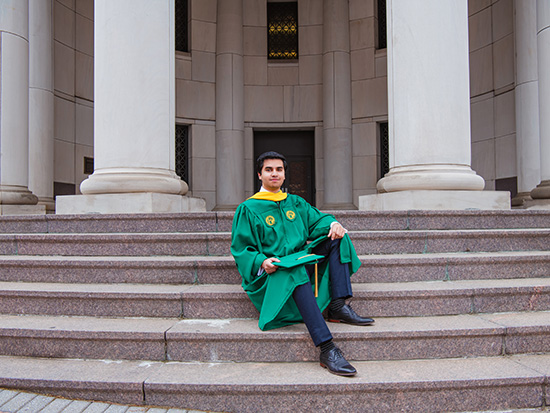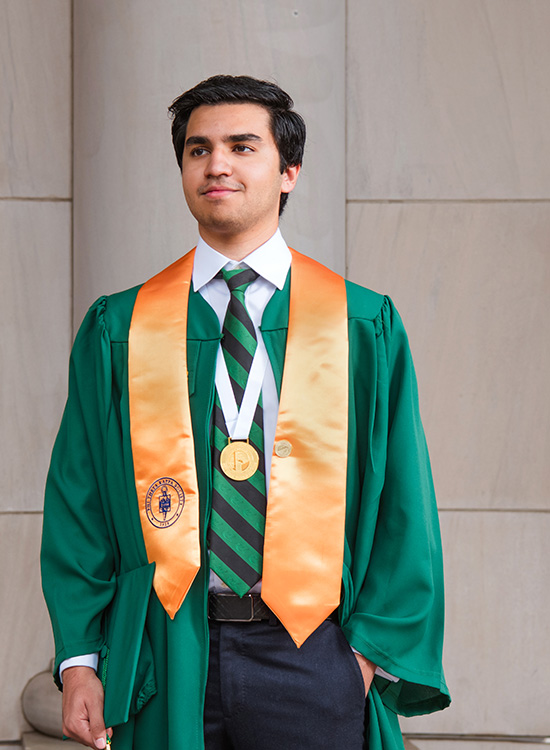 Muhammad Ali Abdullah will receive a Bachelor of Science degree in neuroscience and a Master of Science degree in multidisciplinary biomedical science in on April 26 and April 27 respectively.
Muhammad Ali Abdullah will receive a Bachelor of Science degree in neuroscience and a Master of Science degree in multidisciplinary biomedical science in on April 26 and April 27 respectively.
Photography: Jennifer Alsabrook-TurnerThe limit may be beyond the sky for one University of Alabama at Birmingham student. After immigrating to the United States in 2018 and clearing the hurdles of a demanding journey toward medical school, Muhammad Ali Abdullah will graduate with two degrees from the UAB College of Arts and Sciences and Graduate School this April. Ali, a Pakistani American and resident of Hoover, Alabama, is set to resume his UAB journey at the Marnix E. Heersink School of Medicine in the Primary Care Track this fall.
Immigrating to the United States
Growing up in Rawalpindi, Pakistan, in a military family, Ali developed discipline, adaptability, and a desire for exploration and innovation early on. He faced a new challenge in 2018, as he moved to the United States in his junior year of high school.
“Junior year of high school is a crucial time as students decide which colleges to attend, choose their major, take the ACT and navigate through choices that will impact the rest of their lives,” Ali said.
When he started his junior year, he experienced many culture shocks, one being acclimating to the American education system that operates on GPA-based continuous evaluation from an annual evaluation-based British education system.
“In Pakistan, most schools follow the annual exam-based assessments at the end of the academic year,” Ali said. “Switching from linear examination to a semester-based system and understanding the GPA scale and its implications on my grades demanded changing my study habits and managing time differently. Having a small social circle made it harder.”
 Photography: Jennifer Alsabrook-TurnerInspiration for a medical career
Photography: Jennifer Alsabrook-TurnerInspiration for a medical career
Because Ali belongs to a military family, he had the opportunity to travel extensively around Pakistan, especially to Balochistan, a province grappling with extreme poverty, piquing his interest in medicine.
“The military set up small camps to provide free health care in those areas,” Ali said. “Watching the doctors’ and nurses’ commitment to deliver quality care despite limited resources was deeply touching — something I appreciated and felt a connection toward.”
His interest in the medical field further flourished after helping care for his grandfather, who experienced deteriorating health due to Parkinson’s disease — this was his first time observing patient care at the bedside.
These experiences motivated Ali to start volunteering at the Military Hospital Rawalpindi, a state-of-the-art facility, where both military personnel and civilians from across the country suffering from simple to complex diseases receive free treatment.
“Volunteering at the Military Hospital was a truly unique medical experience,” Ali said. “It exposed me to diseases rare in the U.S., like polio, which only exists in Pakistan and Afghanistan. There, I saw how the lack of medical facilities in rural areas pushed the tertiary care center to its capacity. Yet, the medical professionals handled every patient with compassion, ensuring the best possible patient care.”
This experience catalyzed Ali’s decision of a career in medicine and was the beginning of his enduring volunteerism journey. Thanks to the online classes offered at UAB, he visits Pakistan every summer and volunteers at the same hospital, which helps him foster his network and expands his cross-cultural medical knowledge.
Ali volunteered as an undergraduate student at Children’s of Alabama and Equal Access Birmingham, which developed his interest in primary care and magnified his sensitivity to the difficulties facing underserved populations.
“Working in patient care in two starkly different parts of the world has been a learning opportunity like no other,” Ali said. “These experiences have developed my belief that service and care know no boundaries. It has given me the most treasured trait a physician must have — empathy. Empathy for people’s pain, experiences, values and perspectives.”
Landing at UAB
While in high school, Ali proactively sought connections and mentors to guide him toward a path to medicine, directing him to UAB.
“I learned wonderful things about UAB from pre-medical students who I met in Montgomery, especially how UAB is the best and the biggest medical center in the state,” Ali said. “Most of them were neuroscience majors, which has always been interesting to me because of my grandfather’s neurological disease. But what led me to pursue the neuroscience program was how it was hands-on, research-intensive rather than theory-intensive. Just the idea of being involved in cutting-edge research sparked my curiosity and led me to neuroscience at UAB.”
After being accepted into UAB, Ali visited campus for the first time for his interview for the Honors College’s Science and Technology Honors Program, and it was love at first sight for him.
 Ali is graduating with a Bachelor of Science degree in neuroscience and a Master of Science degree in multidisciplinary biomedical science.
Ali is graduating with a Bachelor of Science degree in neuroscience and a Master of Science degree in multidisciplinary biomedical science.
Photography: Jennifer Alsabrook-Turner“I was very impressed with the modern architecture and the city vibe of the campus,” Ali said.
Being a part of the Sci-Tech program has been monumental in Ali’s academic success because the curriculum provides tremendous opportunities for collaboration with students from across disciplines and valuable mentorship from faculty, he says.
“Ali is a wonderful and inspirational member of our SciTech community,” said Mark Bevensee, Ph.D., assistant dean of the Honors College and the SciTech Program. “He shows remarkable dedication and commitment in all that he pursues, including coursework and research, as well as service in the Honors College, UAB, and beyond. Ali is a caring and compassionate person who listens and engages with others and has a true passion for promoting the wellbeing of others, especially those less fortunate. He will make a fantastic physician in the future.”
According to Ali, involvement with the SciTech Program helped him cultivate a personal and professional network.
“Having the program’s name on my resume helped me secure a position in the UAB Department of Neurology’s prestigious Roberson Lab led by Erik Roberson, M.D., Ph.D.,” Ali said. “The faculty in the program helped me finesse my writing samples and Dr. Bevensee helped me with mock interviews for medical school.”
Ali has worked in Roberson’s Lab on a frontotemporal dementia research project since his freshman year. He presented his research findings at the UAB Spring Research Expo 2023 and at the National Conference on Undergraduate Research in Los Angeles this spring.
As a Presidential Honors fellow, he worked to noninvasively determine the relationship between neuronal activity and the observed brain response through fMRI in the research lab led by Mark Bolding, Ph.D., associate professor in the UAB Department of Radiology.
Ali will receive a Bachelor of Science degree in neuroscience and a Master of Science degree in multidisciplinary biomedical science in on April 26 and April 27 respectively.
“What stands out to me about UAB is how pre-medical students have countless opportunities to be involved in the Heersink School of Medicine through relationships with faculty, research and volunteering opportunities,” Ali said. “Looking back, I see how I was systematically exposed to the world of medicine through my program, which has helped me tremendously in my journey to medical school. This is truly the best place to begin a career in medicine.”
“My favorite thing about UAB is the memories I have made with my peers, faculty and staff. I cherish every moment I have spent with my friends on campus, whether it was hanging out in Sterne Library, going to events with them or playing sports in the Recreation Center.”
Commitment to enhancing campus life
Ali came to UAB during the peak of the COVID-19 pandemic when the university followed a hybrid model of classes which, as for many other students, provided obstacles to participate in campus life.
“The lack of face-to-face social interactions with peers was the most challenging part of transitioning to UAB,” Ali said. “I barely made any friends, let alone friends who shared the same values and cultural background I had. That’s when I felt the urge to bring students together and become a resource for students, especially for those who shared a similar background with me.”
Committed to enhancing UAB’s campus life, Ali joined the Pakistani Students Association, a newly founded student organization at that time, with the goal of making it one of the biggest cultural organizations on campus.
 Ali passed his citizenship test and became a U.S. citizen during his junior year at UAB, which put him one step closer to his medical dream in the United States. “I have served in PSA for three years; I am signing off as president of the organization, and I am proud to have brought PSA where I envisioned it three years ago with my dedicated team,” Ali said. “Today our organization does not just cater to our own cultural celebration but has become a symbol of multicultural celebrations that are open to everyone. Our events attract crowds of more than 150 on average, including students, faculty and staff.”
Ali passed his citizenship test and became a U.S. citizen during his junior year at UAB, which put him one step closer to his medical dream in the United States. “I have served in PSA for three years; I am signing off as president of the organization, and I am proud to have brought PSA where I envisioned it three years ago with my dedicated team,” Ali said. “Today our organization does not just cater to our own cultural celebration but has become a symbol of multicultural celebrations that are open to everyone. Our events attract crowds of more than 150 on average, including students, faculty and staff.”
Ali is most proud of hosting the Multicultural Fashion Show last fall, which brought together eight other cultural organizations to share their food, heritage and glamorous fashions.
“My friend and I were brainstorming ideas for the year when she jokingly said, ‘What about a multicultural fashion show?’ The idea clicked with me, and over planning stages, the intention evolved to make it a trendsetter for the years to come,” Ali said. “It was so well-received from the UAB community; the enthusiasm of our partners and attendees helped us show what it means to be a true Blazer family, and I am so proud of that.”
Community service: Ali’s calling
Ali plans to continue blazing forward through service and leadership. After he gains clinical experience and grassroots knowledge about the problems of the underserved, he aspires to transition into a public health-focused physician and address health care disparities on legislative levels, advocating for health care reforms internationally.
“I feel a deep sense of responsibility to give back to my home country and to the country where I have found a new home,” Ali said. “I owe service to my grooming in Pakistan and the polished education I have received in the United States –– that’s my ultimate goal. That’s what keeps me going.”